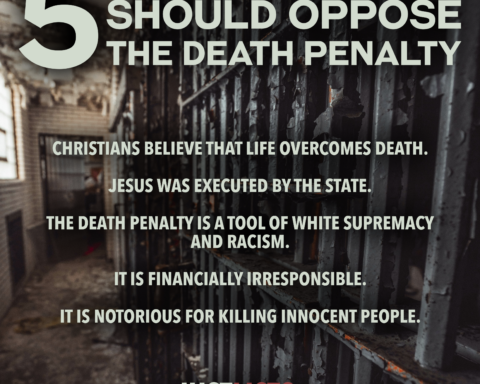Ecumenical Advocacy in our Nation’s Capitol

When we at the Office of Public Witness step outside into the bustle of Capitol Hill, it is common to see packs of people with purple arm bands or orange neckties or yellow book bags traveling together from one congressional office to another, carrying the message of their common cause. They are usually in town for an advocacy conference and use a unifying marker to enhance the impact of their message and their presence on the Hill. Indeed, it is often impressive to see our surroundings filled with so many passionate people.
When we enter an office in the company of an inter-denominational group, we bring not a physical marker but instead carry the shared parts of our respective faith traditions. Every advocate who wears a cross around their neck, tucks a devotional prayer card into their wallet, or carries the word of God in their heart serves to amplify our message of mercy and justice as we do advocacy ecumenically.
We work in ecumenical partnership to advocate on key issues such as criminal justice reform, immigration, militarism, and gun violence. The witness that grows out of these partnerships can be far more powerful than any single press conference, call-in day, or sign-on letter. Together, our resources are enhanced, our spirits bolstered, and our networks of faithful individuals around the country expanded. The ecumenical vision comprises both the search for the visible unity of the Church (Ephesians 4:3) and the “whole inhabited earth” (Matthew 24:14) as the concern of all Christians. We do advocacy ecumenically because together we are louder when we speak truth to power on Capitol Hill. An ecumenical witness magnifies our collective and individual voices as we advocate for just policy for the greater good of our inhabited earth.
___________________________________________
We do advocacy ecumenically because together we are louder when we speak truth to power on Capitol Hill.
___________________________________________
With so many demands on their attention and their vote from moneyed interests, I believe lawmakers are hungry for a moral and ethical voice that advocates for the common good. It can be refreshing for elected officials and their staff – particularly when the elected officials self-identify as people of faith – to enter a meeting and be greeted not with a spreadsheet or a looming budget crisis, but with guidance from the Gospel. When we approach a legislator in ecumenical partnership instead of as a single denomination, it signals to them that we are expressing a broadly shared Christian value held not only by Presbyterians, but by millions of Christians around the country.

Photo Credit: Office of Public Witness
Unlike the grassroots advocates with matching neckties mentioned above, those who represent corporate money and interests don’t advertise their presence: usually just a discrete nametag will mark them as a lobbyist for industrial agriculture or a defense contractor. Our greatest difficulty in the ecumenical advocacy community is that, although we have a strong community of thousands of dedicated faith advocates, we are heavily outnumbered by corporate interests in Washington. With the Citizens United Supreme Court decision of 2010, corporations and super PACS have a great deal more influence in elections and with the officials they help put in office.
When the odds seem stacked against us, OPW Director Rev. Dr. J. Herbert Nelson reminds us, “We are not powerless in this struggle. It’s a challenge for us to remember sometimes, but these individuals in Washington are there because we put them there. And we should remind them of that: We put you there, and in the same way, we can remove you.”
___________________________________________
Perhaps to live in a way that is truly ecumenical is to orient one’s life toward the common good, to exist in the world in a way that promotes the well-being of the “whole inhabited earth”.
___________________________________________
Interestingly enough, it looks as if, when push comes to shove, our congress does heed that reminder. Recently, both the Senate and the House of Representatives introduced landmark criminal justice reform bills with bipartisan. This is remarkable not only because the fiercely divided chambers have compromised on something to move it forward, but also because Republican leaders would not have considered such a measure six months ago. Legislative staff on both sides have credited the Interfaith Criminal Justice Reform Coalition with moving Senator Grassley from Iowa, the chair of the Senate Judiciary Committee, to not only allow a criminal justice reform bill through his committee, but to grant it the firm support of co-sponsorship.

Photo Credit: Office of Public Witness
Pope Francis’ highly anticipated visit was another example of broad based ecumenical advocacy. For months, ecumenical, interfaith, and secular coalitions met to unify our plans around the Pope’s historic visit and ensure his message of economic and environmental justice was broadcast widely. The Office of Public Witness participated in a prayer action on the steps of the capitol building in solidarity with striking federal contract workers, who wished to welcome the Pope. The strike made international news and was an important step in the campaign for those workers to win a fifteen-dollar-an-hour minimum wage and a union. The participation of many different Christian denominations, along with groups from other faith traditions, elevated the profile of the strike and framed it squarely as a matter of justice and an act to challenge exploitation of low-wage workers. In their most recent meeting, the Roman Catholic-Reformed Dialogue in the United States, which includes the PC(USA), issued a statement that expressed similar support:
“We affirm the manner in which Pope Francis modeled a service of unity for the whole church and its ministry. In his intentional compassion for those on society’s margins, his pastoral visits with prisoners, his identification with immigrants, his care for the integrity of God’s creation, and his public testimony to the values of the gospel, he gave voice and witness to aspirations of the wider Christian community.”
Unified support from ecumenical partners for the Pope’s visit helped enormously to make his message not just a Catholic message, but one of a broadly shared struggle for justice.

We celebrate the fact that a chorus of faith organizations bring their denominations’ commitment to justice to our ecumenical advocacy, and we look forward to our yearly advocacy training weekend, Ecumenical Advocacy Days (April 15-18, 2016). This weekend is just one of the many ways we strengthen ecumenical relationships, provide biblical witness, and nurture the Christian voice for justice in our politics. For more information – and if you would like to get involved – please visit advocacydays.org.
As Mark and Ryan mention in their article on ecumenical advocacy at the United Nations, the Greek word oikumene, from which we get our English word ‘ecumenical’ or ‘ecumenism’, is the same word used in passages like Matthew 24:14, translated ‘the world’ or ‘the inhabited earth’. Whether it’s our Reformed understanding of Covenant, the political idea of the common good, or this ecumenical view of the “whole inhabited earth,” there is a general consensus – and a strong conviction, when it comes to people of faith – that justice cannot be limited to our own individual lives. Perhaps then, to live in a way that is truly ecumenical is to orient one’s life toward the common good, to exist in the world in a way that promotes the well-being of the “whole inhabited earth”. Here at the Office of Public Witness, this is the work that we strive to do every day.
___________________________________________________________
AUTHOR BIO: Nora Leccese serves as the Interim Associate for Domestic Poverty and Environmental Issues at the Office of Public Witness. She is an activist and advocate by nature who is deeply committed to racial and economic justice. In her home state of Colorado, she co-founded and chaired the board of a national food rescue non-profit and organized with the fossil fuel divestment movement. She graduated from the University of Colorado with a degree in economics and a focus on community leadership. As an Emerson National Hunger Fellow with the Congressional Hunger Center, Nora researched equitable food systems in Montpelier, Vermont, and served the Office of Public Witness where she focused on criminal justice reform and economic justice.
Learn about ecumenical advocacy in the context of the United Nations!





Unbound Social